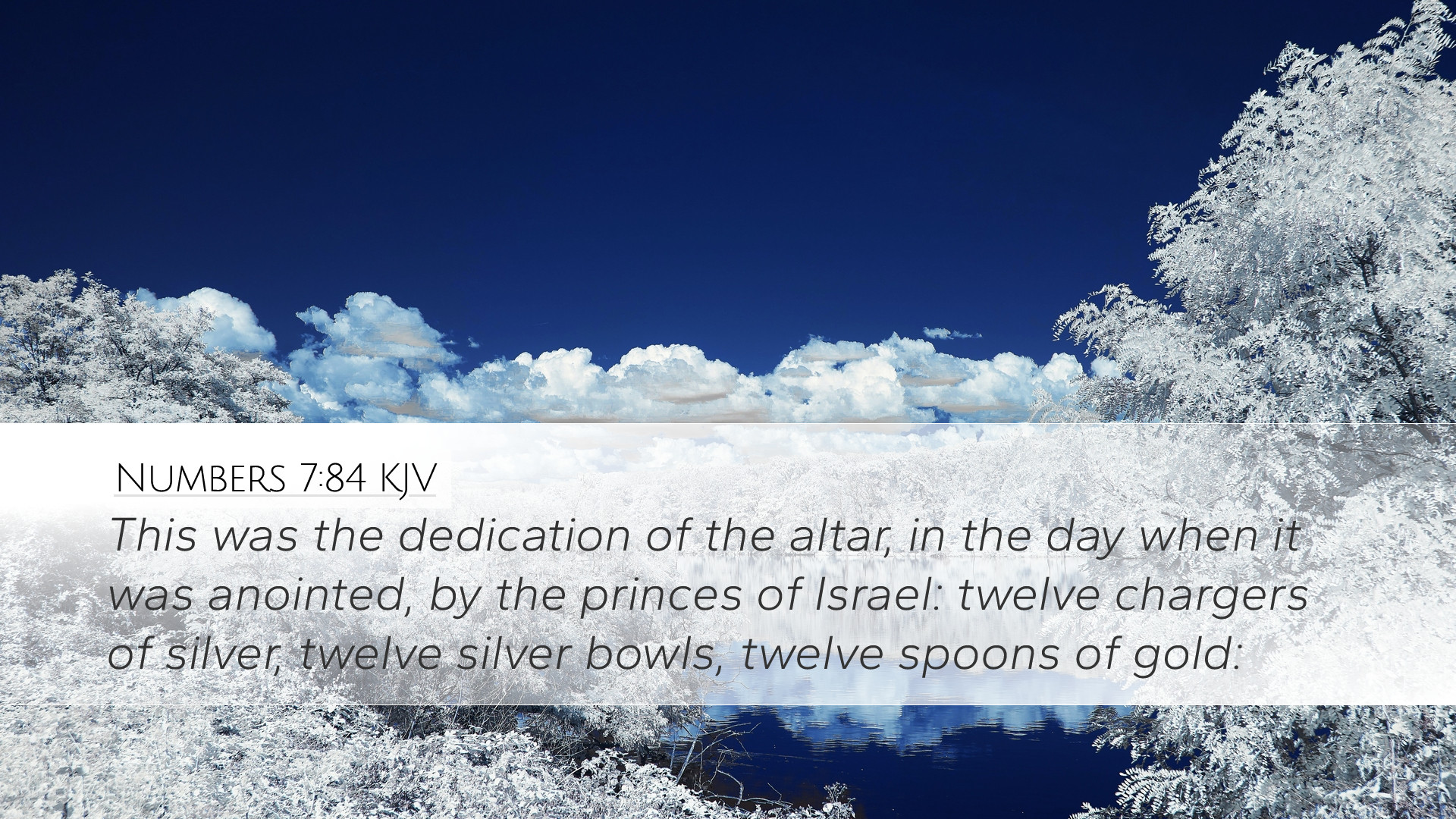Commentary on Numbers 7:84
Numbers 7:84 states: "This was the dedication offering for the altar after it was anointed, 12 young bulls, 12 rams, 12 male lambs a year old, along with their grain offerings; and 12 male goats for the sin offering."
Contextual Background
Before delving into this verse, it is essential to understand its context within the Book of Numbers. The Israelites are at the cusp of entering the Promised Land, having received specific instructions regarding worship and sacrifice. The dedication offerings here are vital in reinforcing the importance of the sacrificial system as a means of approaching God.
The Significance of The Offerings
- The Bull as a Sacrifice: The inclusion of young bulls symbolizes power and wealth. Matthew Henry highlights that these animals serve not just as sacrifices but also reflect the prosperity that God had provided to His people. Furthermore, bulls are often associated with atonement and the strength of God’s grace towards His people.
- The Ram's Role: Albert Barnes notes the ram’s significance in Hebrew culture as a symbol of sacrifice and redemption. This offering particularly underlines the need for individuals to recognize their state before God, emphasizing that their physical gains ought to be accompanied by spiritual humility and gratitude.
- Lambs as Innocence: The male lambs denote purity and innocence, seen as ideal for sacrificial offerings. Adam Clarke elaborates on how the lamb embodies the essence of submission and innocence before God. This serves as a foreshadowing of Christ, the ultimate Lamb of God, who would be sacrificed for the sins of the world.
- The Role of Grain and Goats: The inclusion of grain offerings signifies the worshippers' alliance with God’s provision. Additionally, the mention of the male goats for the sin offering establishes a necessary condition for maintaining a relationship with God—acknowledgment of sin and the provision made for atonement.
Theological Implications
Numbers 7:84 carries significant theological weight, as it emphasizes the foundational principles of sacrifice and atonement that pervade the entire scriptural narrative. The offerings mentioned serve as a precursor to the ultimate sacrifice of Christ and highlight the seriousness of sin in the community of faith.
1. A Foreshadowing of Greater Sacrifice
The multitude of offerings illustrates the seriousness of divine worship, serving as a foreshadowing of the singular, ultimate sacrifice of Jesus Christ. Clarke posits that every aspect of these offerings pointed towards Christ, signifying God’s overarching plan of redemption for humanity.
2. Community and Individual Responsibility
The structured nature of the offerings (12 of each kind) portrays the corporate responsibility of the Israelite community to engage in worship correctly. As Barnes points out, it mirrors the body of Christ today, where individual contributions to the church should reflect collective honor and reverence towards God.
3. The Act of Dedication
Dedication is a fundamental aspect of this verse. The act signifies a communal commitment to recognize God’s sovereignty through acts of worship. Henry observes that such dedications were necessary to impress upon the Israelites their need to remain connected to God through fidelity and allegiance.
Practical Applications
- Understanding the Nature of Sacrifice: This verse challenges modern readers to reassess their understanding of sacrificial living. Pastors and theologians can encourage congregations to view their offerings—not solely in monetary terms—but as a holistic offering of their lives, time, and talents to God.
- Community Worship: The importance of communal participation in worship is exemplified here. Engaging congregations in corporate worship serves to build a stronger, united body of Christ, reflecting the unity seen in the Israelites' dedication offerings.
- Emphasis on Repentance: The requirements for sin offerings remind contemporary believers of the significance of repentance and the need to continually seek God’s forgiveness. This can be a focal point in preaching and teaching.
- Gratitude for Provision: The grain offerings call believers to recognize and appreciate God’s provision. Encouraging gratitude practices within the church fosters an environment of thankfulness, enhancing relational intimacy with God.
Conclusion
Numbers 7:84 serves as a profound reminder of the indispensable role of sacrifice in establishing a relationship with God. By combining the insights of Henry, Barnes, and Clarke, one can glean a comprehensive understanding of the verse's significance both in ancient Israel and in the contemporary church. The themes of atonement, community, and dedication transcend time, urging modern believers to embrace their call to worship holistically and sacrificially in their daily lives.


